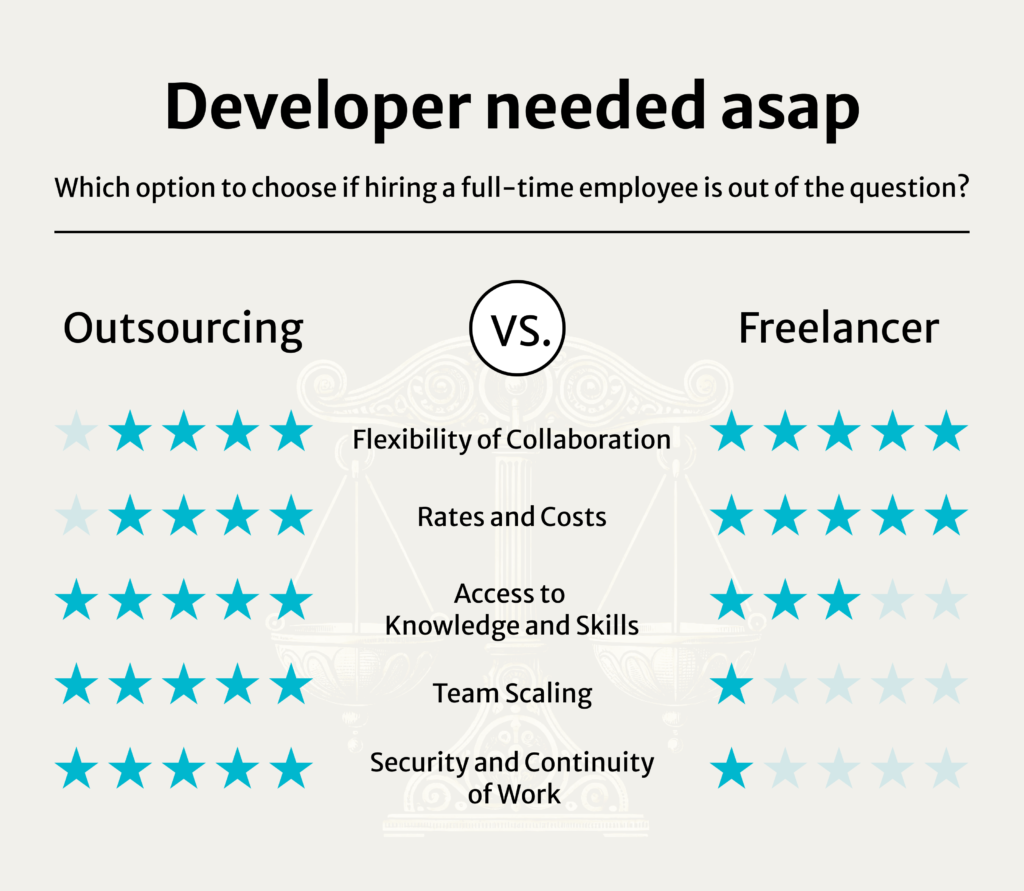There are many reasons why companies choose outsourcing or collaborating with freelancers instead of hiring a full-time employee. Typically, the main advantage is time flexibility. If your company has decided to choose one of these forms… which one will actually be better? And why do companies do this at all?
You might consider outsourcing or collaborating with a freelancer if you find yourself in one of the following situations:
- You need someone in your team with specific skills, such as AR or AI implementation, which no one in your team has experience with, but are required by the client.
- An important developer in your project decided to part ways with you, and now you’re risking delays or failure to meet deadlines.
- Unforeseen issues have arisen in your project. You fear you won’t meet the deadline and need short-term support for your team. Missing the deadline could result in contractual penalties.
- You anticipate needing to expand your team soon but are uncertain about the exact timing or duration. This decision depends on your client’s readiness. In such an uncertain situation, you do not want to hire new people permanently.
Both forms of collaboration share one common factor – leveraging the skills of developers who are not employees of your company.
Outsourcing & collaborating with a freelancer – a simple difference
- Outsourcing is a cooperation with another company, whose specific developers will perform programming tasks for you. Outsourcing has many facets and often actually means “team extension” (when the project is managed on your side, but the team includes external developers), as we discussed here. In this model, you communicate with a representative of the company who matches the appropriate specialists to your situation. The final decision is always yours.
- Collaboration with a freelancer is an agreement with an individual who will do the programming. This might be someone who is self-employed and is legally considered a “company,” but the difference is that communication and contract details are directly negotiated with the person doing the work.
Let’s examine how these two approaches differ, keeping in mind the following aspects:
- Flexibility of Collaboration
- Rates and Costs
- Access to Knowledge and Skills
- Team Scaling
- Security and Continuity of Work

Flexibility of collaboration
Outsourcing vs. Freelancing: Very flexible, with a slight edge to freelancers
Outsourcing is often associated with rigid collaboration rules. Unlike an agreement with a freelancer, it is ultimately an arrangement made with a company (an “institution”), so we naturally think of it as less flexible. However, the reality is different. Many tech companies offer flexible outsourcing collaboration models, such as time-based contracts (e.g., for 1-3 months, with the possibility of extension), the ability to adjust the team during the project, flexible or unconventional working hours. Some specialists even prefer to work in the afternoons instead of finishing work at 4 PM local time.
On the other hand, contrary to popular belief, freelancers are not always available “asap”. Freelancers often work on multiple projects simultaneously, and their availability can be limited. If you need someone for a short-term engagement but full-time, a freelancer may not be able to complete the work for you due to other commitments. On the other hand, freelancers may be open to very irregular work and “after-hours” tasks.
Rates and costs
Outsourcing vs. Freelancer: Freelancers are friendlier to your budget per hour, but…
At first glance, hiring a freelancer should be more cost-effective because there is no “middleman” in the form of a company between you and the developer. Hourly rates vary depending on technology, the specialist’s skill level, and location.
Freelancer: Rates on popular freelance platforms (e.g., Upwork) start at $15/hour and can go up to $200 for iOS developers. On Facebook, you can also find groups where developers offer their work for next to nothing or even completely free (e.g., for portfolio building purposes). “Next to nothing” sounds tempting, but be aware that these too-good-to-be-true rates may hide insufficient skills, which will cost you wasted time and the need to rewrite the code.
Outsourcing: You will also see a wide range of rates when seeking support from outsourcing companies. These, iOS again, start at $25-200, depending on location. Unlike freelancers, companies cannot afford to lower their rates just to work “for the portfolio.”
So, in both cases, you have a spectrum of rates and… a question without an answer: is it worth it?
If you have a tried-and-tested freelancer (e.g., through a recommendation) with whom you deal directly and at a better rate than the market offers—congratulations (it’s unlikely since you are reading this article). If not, you must consider whether your gut instinct is enough to accept the uncertainty of working with an unknown person when the deadline is near.
Remember that hourly rates are not the same as total costs. Total costs also include the time you spend searching for the right person and taking on the potential risk if the specialist does not meet your expectations. Or disappears. But more on that in the following points.
Would you like to receive a sample CV of our developers?
Send an inquiryAccess to knowledge and skills
Outsourcing vs. Freelancer: Outsourcing, because a team is an invaluable asset
Let’s imagine two scenarios:
Scenario I – Developer Encounters a Problem
During the development of an application, a problem or programming challenge will certainly arise. You’ll want the specialist to handle the task as quickly as possible. Is knowledge just like money and it’s “lying on the street”? Partly, yes—you “just” need to find it. Efficiently diagnosing and then coming up with a solution to a problem is of great value—it saves you money and time on delays. Here, leveraging the competencies of developers from an outsourcing company has an advantage over working with freelancers.
Why?
Because they have easier access to knowledge. This stems from the very nature of working in such an organization.
Dev shops usually specialize in a few selected technologies, building teams ranging from a few to even dozens of people. Often, these people work together on a project, sometimes even from the same office. Knowledge and information transfer occurs naturally. Here, freelancers face a disadvantage because they typically work in isolation. Asking another developer to spend time understanding the problem in their project and providing support may be an insurmountable barrier. Freelancers are more likely to seek a solution on their own, which extends the work time. A developer from a dev shop is a member of two teams—yours, the project team, and the company team.
At mobitouch, we understand the value of discussing programming issues face-to-face, which is why we encourage our team to come to the office. If you’re looking for an outsourcing company, it’s worth asking whether their team is dispersed or if people working in the same technologies have the opportunity to work on-site.
Scenario II – Verifying the Developer’s Competence
Your company needs to create a mobile application in Flutter. You don’t specialize in mobile technologies and don’t want to hire developers of this specialization permanently, assuming it’s a one-time project and your expertise lies in another area. You don’t want to lose the client, so you consider engaging external developers. The problem is that you don’t have anyone specializing in Flutter who could recruit a freelancer, verify their skills and knowledge during a technical interview. You must give the freelancer a lot of trust and test them directly on a live system.
In the case of a developer engaged through outsourcing, part of the recruitment process has already been done for you. The fact that the specialist has been vetted and hired by a company that already has a team in the given tech gives you much greater assurance that this person will do the work without needing corrections.
Of course, it’s important to remember that in any collaboration, you extend a certain amount of trust to the specific person, whether they are a freelancer or an employee of an outsourcing company. The difference is that you can check the quality of the company on reliable platforms such as Clutch, where reviews cannot be faked or added by friends.
Team Scaling
Outsourcing vs. Freelancer: Outsourcing, because again… team is an invaluable asset
Adding new team members through outsourcing is relatively simple. You can increase or decrease the number of specialists involved in a project based on your needs, without long-term commitments. Outsourcing companies usually consist of large teams of developers specializing in a few given technologies. Additionally, they have extensive networks of partner companies, allowing them to help find developers outside their specialization. This means you spend less time searching for the right person.
Scaling a team with freelancers can be more complicated. The reason again lies in the nature of freelance work—it’s an individual working alone. If you need additional hands, you’ll need to spend time searching for another person. This process can take several weeks, and the terms of cooperation will need to be individually tailored to each freelancer. Additionally, these will be programmers who have never worked together and might not get along. Therefore, contrary to appearances, working with an outsourcing company is much faster. Freelancers work independently, while a team in an outsourcing company has experience working together, which translates to better coordination and collaboration.
Security and continuity of work
Outsourcing vs. Freelancer: Outsourcing, because contracts and reputation matter
When can you sleep (more) peacefully? When collaborating with an outsourcing company or with a freelancer? After all, regardless of where the specialist comes from, they will be working remotely. And what if… they stop working?
Situation 1: The Developer Disappears
Probability with a freelancer: it happens.
Probability with outsourcing cooperation: it doesn’t happen.
Although very rare, there are situations where a freelancer you’re working with vanishes or doesn’t respond to contact attempts for a long time. In such a situation, you’re left in limbo—has the developer left you for good? Did something happen to them? Should you look for someone else? And who will pay for this?
With a freelancer, you’re likely relying solely on communication methods that have already failed (phone, email, communicators). With an outsourcing company, things are different. An established company won’t disappear off the face of the earth and has other means to find out what happened to the developer if an unexpected absence occurs. In the case of companies, it’s practically unheard of for their programmer to vanish. Additionally, you’re protected by the contract. Failure to fulfill obligations is now the company’s problem, not that of a developer who’s out of reach.
Situation 2: Resignation
Probability with a freelancer: it happens.
Probability with outsourcing cooperation: it happens.
Both you and the developer involved in your project may want to terminate the collaboration. When a freelancer leaves your team (hopefully after a notice period), you again need to find a replacement on your own. In outsourcing cooperation, there is often the possibility of a smooth exchange of developers and knowledge transfer to maintain continuity of work.
Summing up
Outsourcing services or collaborating with freelancers is an ideal option when you don’t want to hire permanent employees. Both models have certain advantages over the other that can influence your final choice. Freelancers may prove to be a bit more flexible in terms of time, and their rates may be lower. On the other hand, collaborating with an outsourcing company is definitely safer, contract terms are easier to enforce, and the work results are often of higher quality due to more efficient knowledge transfer.





